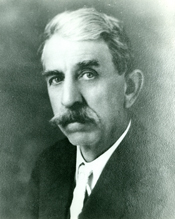William H. Murray
William Henry Davis "Alfalfa Bill" Murray (born November 21, 1869 in Collinsville , Grayson County , Texas , † July 15, 1956 in Tishomingo , Oklahoma ) was an American politician and from 1931 to 1935 the ninth governor of the state of Oklahoma.
Early years and political advancement
Murray attended College Hill Institute in Springtown, Texas. He then became a teacher and newspaper editor himself. After studying law privately, he was admitted to the bar in 1895. In Fort Worth he began to practice in his profession. In 1898 he moved to Tishomingo in what was then Indian territory. There he was the personal lawyer of the responsible territorial governor. He also worked as a rancher .
In 1905 he was a delegate at the so-called Sequoyah Convention , which unsuccessfully sought to found its own Indian state; In 1906 he was a delegate to the Oklahoma Constituent Assembly. Between 1907 and 1908 Murray was a member of the Oklahoma House of Representatives . He was even the first president of this chamber. Between 1914 and 1918 he represented his state in the US House of Representatives in Washington, DC. In 1910 and 1918, he unsuccessfully applied for the Democratic Party's nomination for the office of governor of Oklahoma. In 1908, 1912, 1916 and 1932 he was a delegate to the Democratic National Convention . In the 1920s he moved to Bolivia , where he worked as a rancher. In 1929 he returned to Oklahoma and in 1930 he was elected governor of his state, where he prevailed with 59:41 percent of the vote against Republican Ira A. Hill.
Governor of Oklahoma
William Murray took up his new office on January 12, 1931. During his tenure, the global economic crisis reached its peak. Unemployment rose, banks collapsed, and population poverty increased. The governor launched an aid program and set up a tax commission to monitor government spending. In order to maintain inner peace, he temporarily imposed a state of emergency over the country with the help of the National Guard. In 1932 he was under discussion as a Democratic presidential candidate. The party nominated Franklin D. Roosevelt . Murray rejected his New Deal policy. Even so, Oklahoma benefited from the federal government's program, and as the 1930s progressed, the country gradually recovered from the aftermath of the crisis.
Governor Murray was also a strong advocate of racial segregation. He even set up the National Guard to maintain this institution. Otherwise he was in favor of toll-free state bridges over the Red River to Texas. After the Federal Prohibition Act was abolished in 1933, Oklahoma remained a so-called "dry state" with a ban on alcohol. In Oklahoma, the governor temporarily closed some oil wells because the oil barons did not adhere to his pricing policy. This led to an increase in the price of oil .
Another résumé
In 1938 another attempt to be elected governor failed, already in his party's primary elections. His attempts to be elected to the US Congress were also unsuccessful. Politically, he became more and more of an extremist after his governorship. He became an outspoken racist who came close to fascism, which he supported at least temporarily. With his wife, Mary Alice Hearrell, he had four children, including their son Johnston Murray , who was also to become governor of Oklahoma between 1951 and 1955.
Honors
In honor of William Murray were named:
- the Murray State College in Tishomingo (Oklahoma)
- the Alfalfa County
- the Murray County (Oklahoma)
- of Lake Murray State Park in Ardmore (Oklahoma)
Web links
- William H. Murray in the Biographical Directory of the United States Congress (English)
- William H. Murray in the National Governors Association (English)
- The governors of Oklahoma (English)
- William H. Murray in the database of Find a Grave (English)
| personal data | |
|---|---|
| SURNAME | Murray, William H. |
| ALTERNATIVE NAMES | Murray, William Henry Davis; Alfalfa Bill (nickname) |
| BRIEF DESCRIPTION | American politician |
| DATE OF BIRTH | November 21, 1869 |
| PLACE OF BIRTH | Collinsville , Texas |
| DATE OF DEATH | July 15, 1956 |
| Place of death | Tishomingo , Oklahoma |


